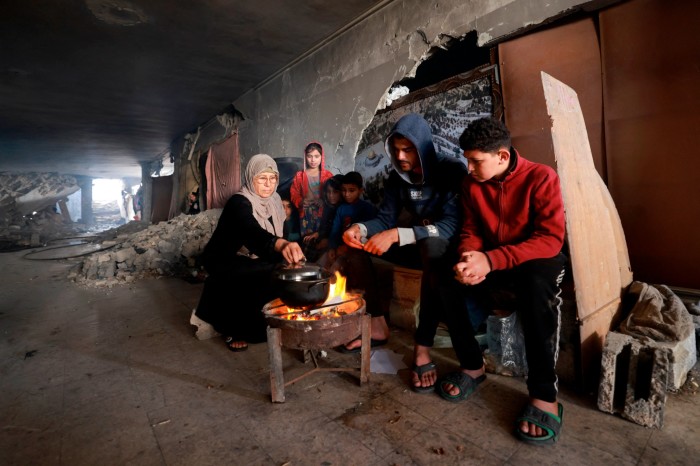Amal Mohamed used to have to chase her young children around their Gaza home to make them finish their dinner. Now they are desperate for food but she can barely afford to feed them.
“We pretend to the children that we’re not hungry or too busy to eat,” said the Palestinian mother of two, whose family has been displaced from the north of the besieged enclave to Rafah in the south, where they share a tent crammed with relatives.
The price of food and firewood for cooking has soared, eating meat has become “a dream” and the adults have cut their food intake so the children can eat, she said. “We’ve all lost weight.”
The family is among more than 2mn people facing severe food shortages as Israel’s Gaza offensive enters its fourth month. UN officials have warned famine is looming. “The long shadow of starvation is stalking the people of Gaza, along with disease, malnutrition and other health threats,” UN secretary-general António Guterres said last week.

Gaza’s population has become almost completely reliant on external aid brought in via the only two entry points — Rafah on the border with Egypt and Kerem Shalom on the Israeli border. The enclave’s commercial farms have been damaged in the war and are largely out of commission. The aid, which includes flour, oil, rice, legumes and canned foods, is mainly delivered to UN warehouses for distribution to shelters and elsewhere, and people have to queue, sometimes for hours, to get food.
Israel had started to allow some commercial deliveries into Gaza but it was not enough, said Scott Anderson, deputy director of operations in Gaza for UNRWA, the main UN agency operating in the enclave.
With minimal food entering the territory, UN agencies warn of a deepening catastrophe. They have called on Israel to open more crossings and simplify its inspection process for trucks, and say the constant Israeli bombardment has impeded food distribution.
“People in Gaza risk dying of hunger just miles from trucks filled with food,” World Food Programme (WFP) executive director Cindy McCain said last week. “We can keep famine at bay but only if we can deliver sufficient supplies and have safe access to everyone in need.”
Gaza’s entire population is facing “crisis or worse levels of acute food insecurity”, according to an assessment cited by the WFP. More than 500,000 face “catastrophe”, defined as an extreme lack of food.

In December, Human Rights Watch accused Israel’s government of using starvation “as a method of warfare” in Gaza, saying Israel was deliberately blocking delivery of water, food and fuel.
Israeli officials have consistently rejected such claims, pointing to daily deliveries into the territory, which Israel facilitates.
Israel launched its military campaign in Gaza in retaliation for the October 7 Hamas attack in which 1,200 people were killed, according to the Israeli government. Israel’s offensive has killed more than 24,000 Palestinians and displaced 85 per cent of the population, Gaza authorities say. The UN fears more deaths from starvation and disease.
“Infectious diseases are spreading in overcrowded shelters . . . People are facing the highest levels of food insecurity ever recorded. Famine is around the corner,” said UN relief chief Martin Griffiths.
Mazen Howeila, 55, displaced from the north with 20 family members and also living in a tent in Rafah, wept as he said: “We can’t take it any more. We eat only bread dipped in thyme. How long will our bodies hold out?”
The shelves in Gaza’s grocery stores are empty of all but a few basic goods such as tinned meat, beans and cheese. Almost no one has any income, putting the prices beyond their means. Fresh foods such as eggs and milk are scarce and prices high: a tray of 30 eggs reached Shk90 ($24) before falling back to about Shk50 — still three times the pre-war price — while milk costs about Shk12 a litre, double the pre-war level.
Anderson said hunger levels “get progressively worse as we go further north”, with near-starvation probable in devastated northern areas where an estimated 300,000 people remained largely beyond the reach of aid workers.
UN officials said it was difficult to secure clearance from Israel to deliver aid in the north. “Many desperate people now approach our trucks to take food directly without waiting for distribution. By the time the Israeli authorities give our convoys the green light, the trucks are almost empty,” said Philippe Lazzarini, UNRWA commissioner-general, on Wednesday.
Just over 100 aid trucks entered Gaza on average each day but 600 were needed, Anderson said. Half would ideally be private operators bringing in goods for sale, which would restart trade and allow donors to give out cash rather than food aid, he added.
This would be more “dignified” for recipients and easier for the UN than transporting goods. “It’s hard to bring in flour for 2mn people at any scale, because it’s very bulky,” Anderson said.
In Rafah, where 1.2mn displaced people are packed into overflowing apartments and UN facilities as well as tents, volunteers have taken to the streets to cook on wood fires and feed the hungry.
On a recent day, people crowded around a man ladling pasta and sauce into their bowls. He loudly admonished children to “move back or you will get burnt”.
Bakr al-Naji, 29, one of the cooks, said his group of 25 volunteers used donated ingredients to make 10,000 meals each day. “I get sad when we run out and there are still children waiting but we have nothing for them.”
Basel al-Lohi, 18, whose family fled the city of Khan Younis, said he came every day for the food, adding: “If I don’t, our only hope of eating would be if some kind person donated a piece of cheese or something.”
Additional reporting by Neri Zilber in Tel Aviv


